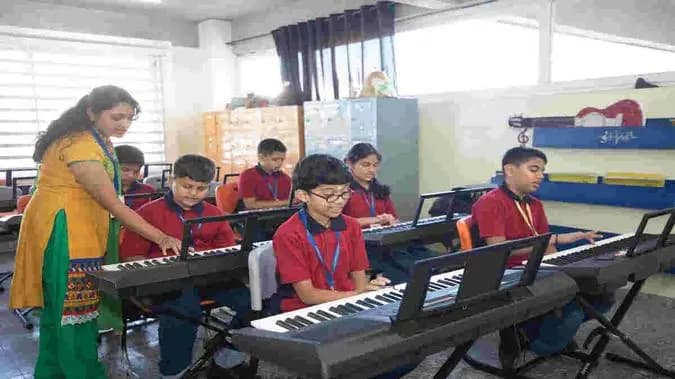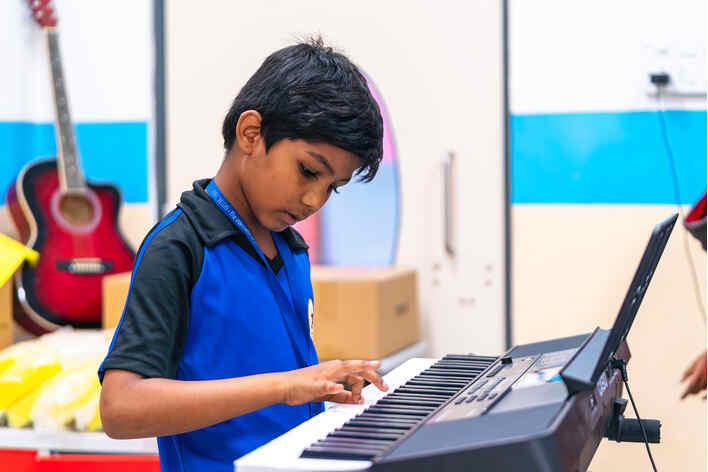The Importance of Music for Children
By Harshitha |
Date 07-08-2024

Table of Contents
Admissions Open for
The importance of music should be realized in an early childhood. Since the beginning of humankind, music has remained to be a very human form of expression, communication, and social connection. In the light of development, no other importance brigades the early exposure of a child to music. From cognitive growth to the emotional well-being of an individual, music plays a vital role in a child's life. The purpose of this blog is to support the reason that makes music part of a child and supports or discusses aspects including cognitive development, growth and maturity through emotional point of view, social angle of life, and most importantly, the significance of music in school curriculum.

Cognitive Development
Boost Brain Function
Music triggers different parts of the brain to enhance neural activity and cognitive functioning. Music stimulates the reorganization of a number of cognitive skills by learning it: memory, attention, and problem-solving. Thus, research has proven that children who perform in music have high IQ levels and better performance in their academics. Learning to read music, play an instrument, and singing is an involved process; attention and coordination are required for the synchronizing process, making it a great way to boost brain development levels.
Language Skills
It can aid in the enhancement of the language of children. Music is filled with patterns and structures. When a child learns musical notes and rhythm, it helps develop phonological awareness, essential in reading and speaking. Plus, when a child learns the lyrics and sings, he can integrate his vocabulary as the words used to know what they mean.
Mathematical Abilities
Music and math have a closer relationship than most people would care to admit. Patterns in rhythmic sounds do involve sequencing and fractions. Musically trained children have their math ingrained in them. Learning how to read music and playing music using notation does indeed contribute significantly towards math and science.
Emotional Growth
Self expression and Creativity
Music can serve to express the emotional and impulsive life of children. Whether children are composing their own music or are improvising, music offers a child a critical means for expressing himself or herself in a non-verbal way that may be unsurpassed with emotion. Such self-expression is critical to emotional well-being in that it provides children the opportunity to deal with difficult emotional content.
Stress Relief and Emotional Regulation
Music has always been an avenue for children to use in releasing their stress and emoting. When they play an instrument or sing, it may be very calming; listening to music may calm them and may lower their level of anxiety. Music therapy has been used widely in children to help control emotions, especially having undergone a traumatic experience, and to boost their mental health.
Creating Confidence and High Self-Esteem
Proficiency of a musical instrument or performance before an audience will definitely help a child in building up confidence and self-esteem. Usually, accomplishing and successfully perfecting a piece of music improves self-perception. One's belonging can even be appreciated during performances, or in choirs build a sense of belonging and can increase self-worth.
Social Skills
Teamwork and Collaboration
Music is very social in nature because it often involves people playing in a band, orchestra and even singing in the choir. By playing and singing together, students learn to appreciate the essence of teamwork and cooperation. It helps them learn to interact with others, listening to them while synchronizing their efforts for the achievement of a collective goal. As far as other aspects in life are concerned, these skills are very essential for a person to gain personal and professional success.
Cultural Awareness and Appreciation
Music is a universal language that cuts across different cultures. By bringing students into contact with different kinds of musical traditions and ways, students are consequently led to gain a better understanding of other cultures. This paves the way that leads to the development of the virtue of empathy and tolerance for others and a global vantage point. In learning to appreciate and share the diversity of cultures, children who are provided exposure to music will develop the virtue of being more inclusive and open-minded individuals.
The Value of Music in Schools
Academic Success
Involving music in the curriculum of a school enhances academic work. Kids from schools that have great music affirmative programs always do well in the tests and the general school work. Music study equips learners in the mechanisms that build critical thinking, problem-solving, and creative skills that would lead to the accomplishment of success in Academic work.
Holistic Child
Music in schools has value that transcends academic benefits alone but also reaches to the broader area of development. Music education enables children to acquire life skills and responses in the cognitive, emotional, social, and physical domains. Music provision in schools adds a more interesting environment that can support a much richer learning environment, which can lead to student involvement and attendance increase.
Discipline and Time Management
Musical learning is best developed by means of discipline, practice, and time management. Students must spend time practicing, follow schedules, and have objectives. These are habits that not only serve the purpose of musical growth but also are valid for academic and personal growth. The discipline of studying music transfers to better habits in study and to organization in other things in life.
Why Music in Schools Matters?
Access and opportunity
Schools provide a regular environment where kids, whatever and whoever they are, can maximize the most out of music studies. They can do this even if they are from different social or economic statuses. This, therefore enables each child to access this and the advantages that come with music acquisition. Any talent that is worth it can be identified and properly groomed through music programs in schools where it may never be realized once outside the school setting
Community and School Spirit
Music programs in schools instil a spirit of community and pride of school. Reinforce togetherness and unity among students, instructors, and parents during performances, concert, and musical events that create unity and a general sense of pride. such performances provide the students with opportunities to express their talents and hard work, which go a long way in building their esteem and confidence.
Importance of Studying Music
Life Skills
Learning music equips children with life skills. Playing an instrument and knowledge of music can be a source of pleasure and a source of satisfaction for a lifetime. It also teaches one to be patient. Learning to play instruments competently is a matter of consistent hard work and perseverance. Such qualities are priceless in every walk of life.
Emotional and Mental Health
But learning music shows enormous effects on the emotional and mental health of a person. Especially during tough and worse times, music can give one reasons to move on with or towards life. Many children find solace and joy in music, which gives them optimism in life.
MUSIC GAMES FOR KIDS OF ALL AGES:
Babies can recognize the tune of a song long before they know the words. Quiet background music is very soothing to babies, especially at rest time. Sing to babies a simple, soft song that is immediately cut to their understanding level. For example, create one or two lines about bath time, dressing, or eating to sing to them while you do these things.
Toddlers and Music
Toddlers love to dance and move to music. Key to toddler music is the repetition of songs, which encourages the use of words and memorization. Silly songs make toddlers laugh. The sky is the limit here; any song becomes a silly song. Try using a familiar song and changing the words, like "Mary had a little spider" rather than lamb. Let children reproduce rhythms by clapping or tapping objects.
Pre-schoolers Music
Pre-schoolers love to sing just for the sake of singing. They aren't self-conscious about their ability, and most of them are more than willing to let their voices roar. They like songs which repeat words and melodies, use rhythms with a definite beat, and ask them to do things and follow directions. Pre-schoolers also love nursery rhymes and songs about things that are familiar to them, like toys, animals, activities at play time, and people. They also enjoy fingerplays and nonsense rhymes with or without musical accompaniment.
School-Age Children and Music
School age children start to show their regard and dislike for a great variety of music. They may even indicate a desire for music training, like music lessons for kids.
There is no harm in getting children to interact with music through playful events; it is how we tend to benefit from music since birth. From listening to calming sounds and rhythmic harmonies, the unadulterated pleasure of music passes; children could gather new language and social skills through music which can enrich the sense and life of people surrounding them.
IMPORTANCE OF MUSIC IN CHILD DEVELOPMENT
1. Elation and Joy
The very manner music enthralls and elates us adults, it does similarly to kids. Pleasant music can very well elate them and become happy. Music is through and through a mood booster for kids, and the same has the capability to refrain from them being in a state of sadness or loneliness. It also instills good thoughts, such as positive feelings of goodwill and love.
Feelings of joy and happiness secure to be experienced a lot, while growing. Mood swinging and stress make their brains weak, which directly affects their learning power and mental health.
As the great American philosopher William James has said very correctly, "I don't sing because I'm happy. I'm happy because I sing."
2. Develops Intimacy EOS
Just as actual human relationships develop the sense of intimacy in children, the relevant music can do it as well. Basic exercises to develop the feeling of intimacy in children include spending more time with them, hugging them every now and then, and playing soulful music.
For instance, it could be used to play some lullabies in order to calm them down and make them sleep. It also brings a sense of care, love, and security to kids.
3. Imagination Power and Communication
Even when the child is not able to talk, music helps him develop neural pathways. Neural Pathways Listening and Speaking. When the kid listens to good music, his brain starts to develop faster with these neural pathways, which increase his imagination power and communication.
You will tend to realize children imitating some songs or even babbling. That is how it works for children. With such benefits at hand, the role of music in child development cannot be ignored. This tends to make them creative even to know the meaning of phrases and wordings.
4. Sensory Development
Similarly, just the way textures, colors, etc. are important to develop senses in kids, music is also a key ingredient for the same. You should play various types of music for your kids so that varied pathways are developed in the brain cells of your kids. All these complete this.perhaps most necessary.sense of belongingness.
Many preschools and primary schools include music in their curriculum so that the children feel connected to the things happening around them. For example, schools make kids perform songs and dances with respect to the freedom of the country, hence making them realize the role of soldiers and brave hearts.
5. Verbal Intelligence
Further empirics hold that musical lessons enable toddlers to increase their verbal IQ significantly. In only 20 days of practicing, this empiric pointed out, 90% of children showed their verbal IQ .
To add on, music also enables the child to grasp the new pertaining to the words they could want in a better way and learn what they mean.
Conclusion
In other words, the significance of music in children's dimensions is cognitive, emotional, and social, making both dimensions complete. Inclusion of music in schools will ensure equity in accessing the gains encountered in music, provide community spirit, and boost academic standards. Knowing why music is important puts appreciate on its deep impact in shaping well-rounded, resilient, and empathetic individuals. The more we recognize and support music in the life of a child, the more ways are opened toward a harmonious and enriched future.
A large array of reasons music is important for children includes the fact that it improves cognitive development, emotional growth, and social skills, and music in schools is very important. From enhancing functioning potential of the brain to language development, out to building up teams and appreciation culture, the list of gains is endless. Integrating music into education can help to ensure every child comes into contact with the ability of music to transform, setting a base for lifelong enrichment and success.
Frequently asked question
How important is music for children?
Music helps in improved concentration and also helps in overall development of the children. Music depicts the traditional culture which is important for the children to know.
Why music matters for kids?
The music is like a fun loving activity for children. Also exposure to music helps in improving the vocabulary of children. Thus it is recommended that children should learn music at an early age.
Liked what you read? Feel free to share this article with your friends and spread the knowledge!
Related Blogs
Music Theory for Kids: Explore the basics of music theory crafted for kids.
Music for language development: See how music supports children's language skills by improving vocabulary, pronunciation, and communication through fun, engaging activities.
Music and Rhythm Activities: Explore exciting music and rhythm activities that enhance creativity, coordination, and fun for kids.
CBSE Schools In Popular Cities
- CBSE Schools in Bangalore
- CBSE Schools in Mumbai
- CBSE Schools in Pune
- CBSE Schools in Hyderabad
- CBSE Schools in Chennai
- CBSE Schools in Gurgaon
- CBSE Schools in Kolkata
- CBSE Schools in Indore
- CBSE Schools in Sonipat
- CBSE Schools in Delhi
- CBSE Schools in Rohtak
- CBSE Schools in Bhopal
- CBSE Schools in Aurangabad
- CBSE Schools in Jabalpur
- CBSE Schools in Jaipur
- CBSE Schools in Jodhpur
- CBSE Schools in Nagpur
- CBSE Schools in Ahmednagar
- CBSE School In Tumkur

Call Us to know more about Orchids
Swipe Up


.jpg&w=1920&q=80)













